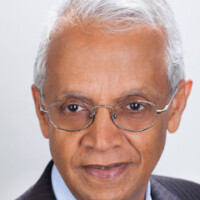Veerabhadran Ramanathan is a Distinguished Professor at Scripps Institution of Oceanography at UC San Diego, and UNESCO Professor of Climate and Policy at TERI University, New Delhi, India.
Dr. Ramanathan discovered the greenhouse effect of halocarbons, particularly, CFCs in 1975. Along with R. Madden, predicted in 1980 that global warming would be detected by 2000. In 1985, he led the first international NASA/WMO/UNEP assessment on the climate effects of non-CO2 greenhouse gases and concluded that they are as important as CO2 to global climate change. He was among a team of four which developed the first version of the US community climate model in the 1980s. In 1989, he led a NASA study that used satellite radiation budget instruments to conclude that clouds had a large global cooling effect. He led an international field experiment in the 1990s, with Paul Crutzen, that discovered the widespread Atmospheric Brown Clouds (ABCs) over S. Asia, which have devastating health and climate impacts.
He developed light weight unmanned aerial vehicles to track pollution plumes from S. Asia, E. Asia and N. America. His recent finding is that mitigation of short lived climate pollutants (black carbon, methane, ozone and HFCs) will slow down global warming significantly during this century. This proposal has now been adopted by the United Nations and 30 countries including USA and a new coalition, called as the, Climate and Clean Air Coalition is implementing mitigation actions for short lived climate pollutants. He now leads Project Surya which is mitigating black carbon and other climate warming emissions from solid biomass cooking in S. Asia and Kenya and is documenting their effects on public health and environment. Teaming up with California Air Resources Board and R. K Pachauri, he has initiated a World Bank sponsored project to reduce soot emissions from the transportation sector in India.
He has won numerous prestigious awards including the Tyler prize. the top environment prize given in the US; the Volvo Prize; the Rossby Prize and the Zayed prize. In 2013, he was awarded the top environment prize from the United Nations, the Champions of Earth for Science and Innovation. He has been elected to the US National Academy of Sciences, American Philosophical Society, the Pontifical Academy by Pope John Paul II and the Royal Swedish Academy of Sciences.
He is now serving in Pope Francis’ Council for the Pontifical Academy of Sciences; and UNESCO awarded the Climate and Policy professorship at TERI Deemed- University in New Delhi, India. He is co-organizer of a 2014 Vatican meeting on “Sustainable Humanity, Sustainable Nature” of social and natural scientists, philosophers and policy makers.
